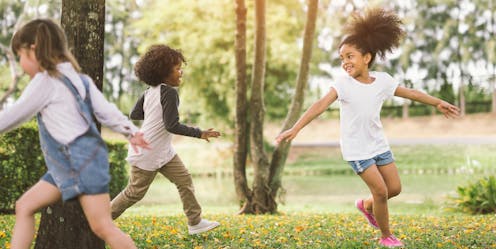
Every parent knows kids spend their time differently when they’re on holidays. Our new research found out just how differently.
During the school term, kids get up around 7am, get into their uniforms, make their way to school, eat food from their lunchboxes or canteens, play at recess and lunch, have PE lessons, sit and get bored or excited in class, and then head home. Their day is highly structured.
However during school holidays, all this goes out the window. Our new research shows in the summer holidays, kids are getting less physical activity, more screentime, and eating more junk food and less fruit than they do during term time.
So what can families do to counter this?
Read more: Richer schools' students run faster: how the inequality in sport flows through to health
What our research found
We asked 358 children aged nine to 11 years from 24 primary schools across Adelaide to wear an activity band for four weeks across the school year and one week during the summer holidays. At the same time, we asked the children to tell us about the activities they did and what they ate.
From the activity band data, we found during the summer holidays, kids sit for an extra 27 minutes, and spend 12 minutes less doing physical activity. From asking the kids about the activities they did, we found kids get 73 minutes more screen time each day, they spend an extra 22 minutes in cars, buses and trains, and 23 more minutes eating or grooming. They also spend an extra 16 minutes just chilling (sitting listening to music or doing nothing).
These findings mean their overall energy expenditure is about 13% lower. We also found kids’ diet quality is lower — more junk food and about half a serve less fruits each day than in school time.
Why does it matter?
More physical activity and less screen time are linked to better physical and mental health, higher levels of fitness, better school grades, and lower risk of becoming overweight. Overweight and obesity in childhood can lead to an increased risk of developing type 2 diabetes, problems sleeping, and low self-esteem.
During the school year kids don’t gain much weight, but they do in the summer holidays. We found on average, all participating kids’ weight increased six times faster during the summer holidays than during term time. In fact, if kids lived every day like they do when they’re on summer holidays, they’d put on an extra 6 kilograms a year. Kids are also losing fitness, and their mental health and wellbeing suffer over the summer holidays.
These effects are worse in children from poorer, less educated backgrounds, and kids who are already overweight.
How can we maintain the benefits of kids being at school, during the holidays?
Some have called for shorter school holidays. But Australian summer holidays are quite short by world standards. Parents in Australia might welcome the four weeks enjoyed by Singaporean students, and children the 14 weeks endured by parents in Egypt.
In the United States and Europe, many children go to summer camps in the summer holidays. These can be overnight camps, where kids stay overnight, or day camps where kids go home at the end of each day. The length of these camps varies widely and can be short (1 to 2 weeks), mid-length (3 to 5 weeks) or the full summer session (7 weeks or more).
Research has shown where kids go to a summer camp daily (Monday to Thursday) for six weeks over the summer, kids are more active, less stationary and eat healthier diets on the days they go to summer day camp, compared to the days when they stay at home. These camps may be residential or day camps, and may combine physical activity with specific learning activities, such as coding, art or drama.
Families may also try getting their kids outdoors. Research has shown kids are likely to be more active when they are outdoors. Families may also try getting their kids to do something physically active before allowing them screen time - this could even be doing chores like mopping the floor.
Families may try to add extra structure to their children’s holiday days, but it’s pretty hard to resist the opportunity to sleep in, snack and binge on Netflix and video games, when the content is precisely designed to keep kids watching.
Big problems need bold solutions – is it time for school administrators and policy makers to reconsider the length of the school holidays, or the lack of summer holiday programming, for the sake of our kids’ health?
Summer holiday programming might come from a variety of organisations such as sports and activity clubs, schools, religious organisations, museums and art galleries, disability groups, as well as the private sector which also offers summer camps.
Some ways to get everyone out of the house and moving could include the family enjoying a day out at the zoo, going climbing at [Tree Climb], spending the day swimming and sliding at your local aquatic centre, or spending time with the animals at Hahndorf’s Farm Barn.
Amanda Watson receives funding from the National Health and Medical Research Council.
Carol Maher receives funding from the Medical Research Future Fund, the National Health and Medical Research Council, the National Heart Foundation, the SA Department for Education, the SA Department for Innovation and Skills, Healthway, Hunter New England Local Health District, the Central Adelaide Local Health Network, and LeapForward.
Tim Olds receives funding from the Australian Research Council and the National Health and Medical Research Council.
This article was originally published on The Conversation. Read the original article.







